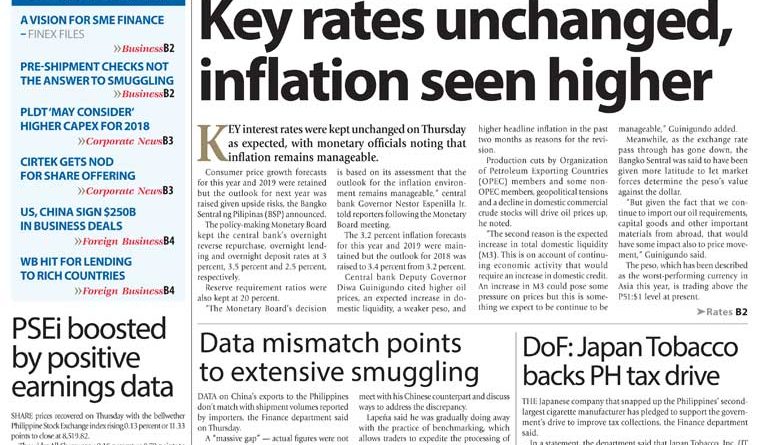Business | BSP monetary policy: Key rates unchanged, inflation seen higher
Key interest rates were kept unchanged on Thursday as expected, with monetary officials noting that inflation remains manageable.
Consumer price growth forecasts for this year and 2019 were retained but the outlook for next year was raised given upside risks, the Bangko Sentral ng Pilipinas (BSP) announced.
The policy-making Monetary Board kept the central bank’s overnight reverse repurchase, overnight lending and overnight deposit rates at 3 percent, 3.5 percent and 2.5 percent, respectively.
Reserve requirement ratios were also kept at 20 percent.
“The Monetary Board’s decision is based on its assessment that the outlook for the inflation environment remains manageable,” central bank Governor Nestor Espenilla Jr. told reporters following the Monetary Board meeting.
The 3.2 percent inflation forecasts for this year and 2019 were maintained but the outlook for 2018 was raised to 3.4 percent from 3.2 percent.
Central bank Deputy Governor Diwa Guinigundo cited higher oil prices, an expected increase in domestic liquidity, a weaker peso, and higher headline inflation in the past two months as reasons for the revision.
Production cuts by Organization of Petroleum Exporting Countries (OPEC) members and some non-OPEC members, geopolitical tensions and a decline in domestic commercial crude stocks will drive oil prices up, he noted.
“The second reason is the expected increase in total domestic liquidity (M3). This is on account of continuing economic activity that would require an increase in domestic credit. An increase in M3 could pose some pressure on prices but this is something we expect to be continue to be manageable,” Guinigundo added.
Meanwhile, as the exchange rate pass through has gone down, the Bangko Sentral was said to have been given more latitude to let market forces determine the peso’s value against the dollar.
“But given the fact that we continue to import our oil requirements, capital goods and other important materials from abroad, that would have some impact also to price movement,” Guinigundo said.
The peso, which has been described as the worst-performing currency in Asia this year, is trading above the P51:$1 level at present.
Finally, the BSP official said the September and October inflation rates of 3.4 percent and 3.5 percent were higher that forecast.
Within target
Still, Espenilla said the future inflation path was expected to stay within the 2 percent to 4 percent target range.
“While inflation has trended higher due mainly to higher utility rates and fuel prices, latest forecasts continue to show the future inflation path staying within the government’s 3 percent plus or minus 1 percentage point target range for 2018-2019,” he said.
Inflation expectations also remained anchored close to the midpoint of the inflation target range over the policy horizon, he added.
The balance of risks, however, continues to lean towards the upside due to possible higher crude oil prices.
The government’s proposed tax reform program may exert potential transitory pressures although various social safety nets and a resulting improvement in output and productivity are expected to temper the impact on inflation over the medium term, the BSP chief said.
The replacement of quantitative restrictions with tariffs and the deregulation of rice imports could also limit inflation, he added.
Downside risks to global growth, meanwhile, are expected to come from geopolitical tensions and lingering uncertainty over macroeconomic policies in advanced economies.
“Nonetheless, the outlook for domestic economic activity remains firm, supported by positive consumer and business sentiment and ample liquidity,” Espenilla said.
While credit continues to expand in line with output growth, the Monetary Board remains watchful over evolving liquidity and credit conditions and their implications for price and financial stability.
Based on these considerations, monetary authorities believe that prevailing monetary policy settings remain appropriate, he said.
“The BSP will continue to monitor price and output developments for any risks to the inflation outlook and will adjust its policy settings as necessary to ensure stable prices and sustainable economic growth,” Espenilla added.
Analysts’ expectations
London-based research consultancy firm Capital Economics said it expects the policy rate to remain unchanged over the course of next year.
“It was no surprise that the Philippines central bank held its policy rate at 3 percent today, with 16 out of the 17 analysts polled by Bloomberg, including ourselves, correctly expecting the decision,” said its Asia economist Gareth Leather.
Looking ahead, he said fears that the economy was overheating were exaggerated as many of the current concerns centered on the rapid pace of credit growth and the disappearance of the current account surplus.
Leather said both were mainly the result of a boom in investment rather than an unsustainable consumer boom.
“Meanwhile, although inflation reached a three-year high of 3.5 percent year-on-year in October, this has been predominately due to an increase in transport price inflation. With oil price inflation set to ease, headline inflation should fade over the coming quarters,” he added.
Unlike the consensus of rate hikes next year, Capital Economic expects that interest rates will remain on hold throughout 2018.
“Overall, we doubt the BSP will be any hurry to tighten policy,” Leather said.
ANZ Research economists, on the other hand, expects a policy rates hike in the first quarter of 2018.
“In our view, upside risks to inflation are becoming significant. Adjustments to transport prices and the pending tax reform will add to the current demand-pull pressures on prices,” they said.
The economists added that credit growth was also rising at its fastest pace since the end of 2011.
“Considering these deepening imbalances in the economy, we stand by our view that policy tightening is necessary and expect policy rate hikes of 50bps (cumulative) in Q1 2018,” they said.
NOTE : All photographs, news, editorials, opinions, information, data, others have been taken from the Internet ..aseanews.net | [email protected] |
For comments, Email to :
Pahulu Gan – Contributor | [email protected]









